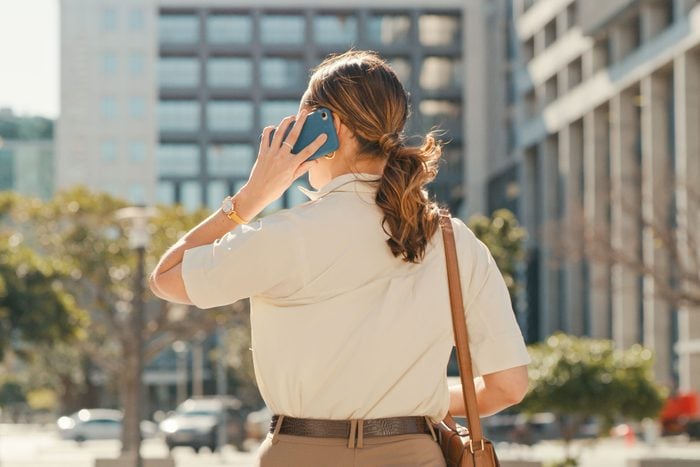
Think twice before making that call!
Cellphones have infiltrated every facet of our lives, but cellphone etiquette is still somewhat elusive. After all, isn’t talking on your phone just like talking to someone who’s right next to you? The short answer is no. Just think about hearing someone in a store negotiating with their kid in a one-sided conversation or folks on the subway navigating a breakup—on speakerphone! Things can get weird fast, not to mention potentially dangerous.
“Cellphones can be unsafe distractions—mostly because there’s a loss of situational awareness when you interact with your phone,” says Bob Otter, a retired fire department captain with 26 years of experience and the founder of CitizenAID. “The cellphone has single-handedly made our general public more vulnerable than at any time in history.”
Talking on speakerphone in public is even worse, in terms of both etiquette and safety. “Using your speakerphone can lead to those around you learning more about you than they ever wanted to,” notes Chris Hauk, a consumer-privacy expert at Pixel Privacy, “and if any bad actors are in the crowd around you, they may seize the opportunity to overhear your personal information.”
So where shouldn’t you talk on your cellphone? We talked to safety, tech and etiquette experts to settle the debate once and for all.
Get Reader’s Digest’s Read Up newsletter for more tech, travel, humor, cleaning and fun facts all week long.
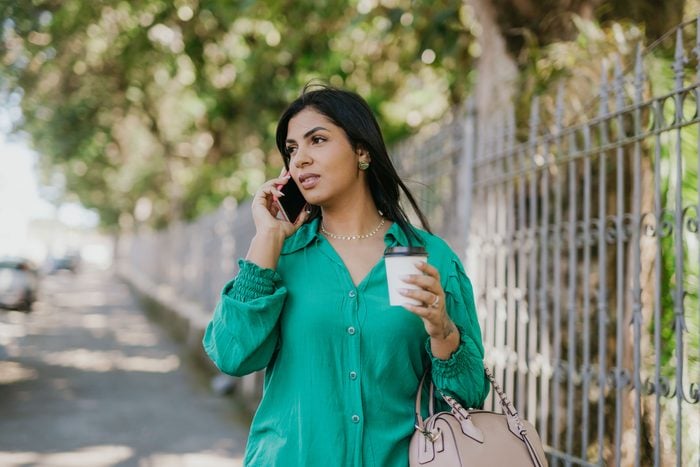
While walking
Catching up with your bestie while getting in your steps around the neighborhood or on a trail might seem like an excellent bit of multitasking. But truly, no one wants to hear your conversation—and beyond that, it can be dangerous because you’re not fully paying attention to your surroundings. Think about the people coming up behind you, like the kid riding his bike for the first time or the dog on a long leash.
Busy city streets take the danger up a notch, with aggressive drivers and speeding bicyclists. “Pedestrian accidents are a real thing, and the frequency of them is on a skyrocketing trajectory,” Otter explains. “Crossing the street while you are talking or texting? You used to be subject to fines for jaywalking, but I’d argue that ‘cellwalking’ is far more dangerous.”
What to do instead: Unless the call is an absolute emergency, it can wait. If it’s an emergency, “pull over” out of the stream of other walkers to take the call.

While shopping
Sometimes you have a question in relation to your shopping excursion, and it’s fine to make a quick call. But don’t stay on the phone and have a whole conversation—that’s inconsiderate to your fellow shoppers and may even put you at risk. “If you’re distracted by your phone, you aren’t aware of the man who has been following you and your daughter in three separate aisles without a grocery cart of his own or any indication that he is actually shopping,” Otter says. “He might be looking for a bulk container of cheese puffs, but he might be a pickpocket looking at your purse that’s in your cart and partially open. Even worse, he might grab your kid.”
What to do instead: Avoid last-minute calls by getting organized in advance. If you spot a great sale, snap up the bargains (you can always return them!) or make a mental note to check back when you get home to see if your family needs anything. If you must make a call while shopping, find a quiet corner and make it quick. FYI, the same holds true when you’re in the fitting room.

At a sit-down restaurant
Cellphones have done a number on restaurant etiquette, and whipping them out at the dinner table is a major faux pas. “We meet not merely to eat but to commune with others, and it really isn’t the time to be talking or texting with those who are not there,” says Laura Windsor, founder of the Laura Windsor Etiquette & Protocol Academy in London. “Honor the people sitting with you at the table by being truly present. The true spirit of etiquette is following the golden rule: putting others at ease and making them feel special.”
What to do instead: Set your phone on vibrate. “We all need to be available in case of an emergency, so vibrate mode is the least conspicuous setting,” Windsor says, adding that phones should be tucked away and not set on the table. “The only thing you should bring to the table is good humor and yourself. Everything else should be hidden from sight.” Excuse yourself if you need to take the call, and go somewhere private.
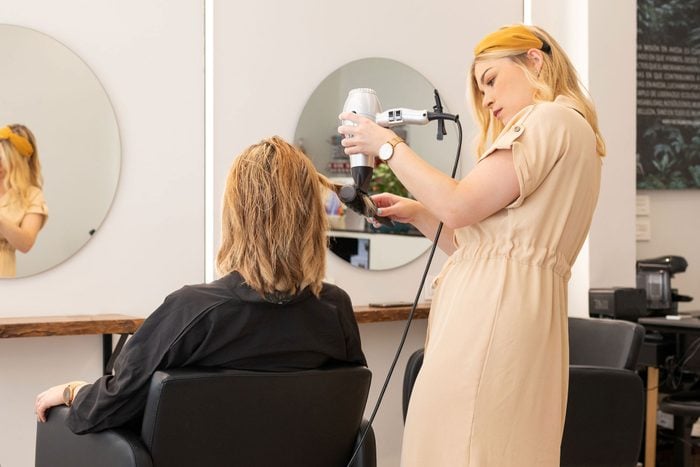
In a salon or spa
In our increasingly fast-paced world, it’s critical to take time to relax and recharge. Yes, you might find it relaxing to talk on the phone while you’re getting a manicure, but trust us—no one else does! Respect the fact that other guests are also taking some time for themselves and that the technicians are working.
What to do instead: Schedule services when you’re less likely to have pressing commitments, and set your phone on Do Not Disturb or vibrate. “Notify your family that you will be unavailable for the next 45 minutes, so unless it is an emergency, they should not call you,” Windsor says.
That said, sometimes things come up, so if you really need to pick up, speak quietly. “For some reason, people tend to increase their voice levels to compensate for the absence of visual cues,” Windsor notes, “so if you can, perhaps mask your mouth using your hand so your voice doesn’t travel too far.” Or if you’re in a private room, tell your technician that you need to take the call and note that they can leave the room if they’d like until the conversation is over.
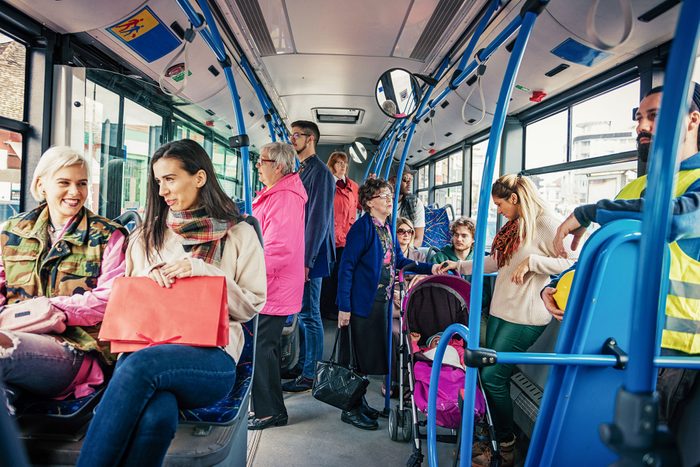
On public transportation
While public transportation isn’t inherently relaxing, we should all do our best to help the people around us have as much peace in their days as possible. Etiquette expert Nick Leighton, host of the weekly comedy podcast Were You Raised by Wolves?, asks us to imagine a world in which all 100 people on a subway car were talking on the phone at the same time. “Does that sound like a world we want to live in?” he says. “Of course not. We can all do our part by being mindful of the psychic space of our fellow passengers.”
What to do instead: While talking on the phone is intrusive, inappropriate and inconsiderate, Leighton says we should “feel free to text away.” Otter adds that texting is better than talking on the phone, but we should avoid getting so engrossed in texting or scrolling through social media that we’re unaware of our surroundings.

At a hospital
First of all, there are medical personnel around you dealing with potentially life-threatening situations, and gabbing on the phone can distract them. But there’s another reason for those “no cellphone” signs in hospitals. According to the FDA, electromagnetic interference (EMI) and radio frequency energy (RF) from cellphones interact with some electronic medical devices, including implanted defibrillators and pacemakers.
What to do instead: If you need to convey information about the health status of a family member, friend or loved one, step into the main lobby area, where cellphone use is generally permitted, or go outside to make your call.
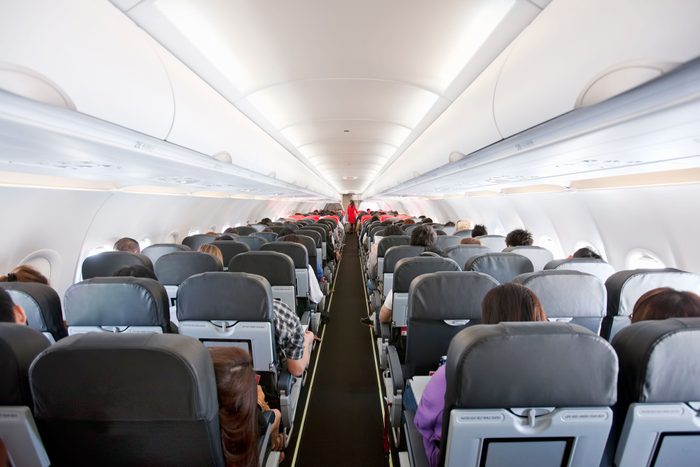
On an airplane
When the pilot tells you it’s time to switch to airplane mode, do it. It’s not just that talking on the phone is annoying to your fellow passengers—it’s also a serious safety hazard. The issue? Your cellphone could potentially interfere with radio signals that the pilot needs to communicate with ground control, deal with an emergency situation or receive data about the exact height of the airplane for landing (something that’s especially crucial in fog or bad weather). While this is a rare complication, it could lead to a crash, and it’s just not worth it. Your call can wait!
What to do instead: If an urgent message needs to be conveyed, get on the plane’s Wi-Fi (if your plane has it) and try to deal with the issue via text or email—or let the person know that you’ll be in touch when you land.

At an interview
When interviewing for a job, your full attention should be on the conversation at hand. Full stop. “During any sort of interview, your phone should be on silent—at minimum,” advises Jules Martinez Hirst, an etiquette expert and co-author of the book Power of Civility. “It doesn’t matter whether the interview is in person or via Zoom. Your attention should be on the interview and on answering the questions presented as best as possible.”
What to do instead: Turn off your phone to prevent interruptions. “If you forget to turn off your phone and it makes a noise, don’t answer it, and apologize to the person you are with,” Hirst suggests. “Put your phone on silent or turn it off and continue with the interview.”
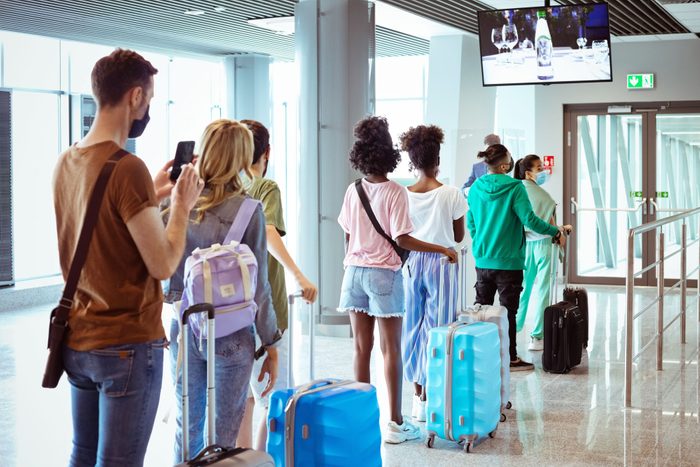
While on line
It’s OK to send a text or check email while waiting on line, as long as you stay fully aware so you don’t accidentally hold up the people behind you. But phone calls are a no-no. “Nobody wants to be trapped in line with you listening to a one-sided conversation,” Leighton says. “But more important is making sure you’re giving your full attention to what’s happening in the queue so you don’t miss a beat stepping forward and pulling out your boarding pass or wallet when the time comes.”
What to do instead: Stay present, and make sure to have your money, identification or boarding pass ready when you need it. If you don’t have the latter handy, it’s the surest way to annoy a TSA agent, not to mention hold up the line. Let’s all agree to cooperate so we can get through security faster!

At a co-working space
You might be shocked about this one, because talking may be a big part of your job … but a co-working site like WeWork is not your company’s office (or your home office, for that matter). You’re sharing the space with other people, and they likely want to focus on their own work in silence to maximize their productivity. Plus, different co-working spaces have different rules, so make sure to familiarize yourself with the protocols, especially regarding quiet spaces.
What to do instead: If you need to listen to a webinar or a meeting where you’re not required to participate, Hirst suggests using headphones to keep the noise to a minimum. Need to make a call? “Most membership-based co-working sites have designated phone booths that you are required to use for your calls,” Hirst says. “If your co-working office has these designated phone areas, use them for your calls so that you are not disturbing the co-workers around you.”

During a wedding or funeral
This should go without saying … and yet, many of us have witnessed this serious breach of wedding and funeral etiquette first-hand. At weddings, it’s all too easy to make this mistake since we often use our smartphones to take photos. And while funeral services like a wake or shiva may feel a little less formal than a service in a house of worship, they are still very solemn events and you should not be on your phone, whether it’s to talk or text.
What to do instead: Silence your phone, or better yet, turn it off. “If you have children at home with a babysitter, or find yourself in a similar circumstance where it would be necessary to take a phone call in case of an emergency, avoid answering the call until you can step outside,” suggests Mariah Grumet, the founder of Old Soul Etiquette. When you step away is also a crucial consideration. “Unless there is an extenuating circumstance, don’t get up during the ceremony or speeches, for example, and wait for a time where it would not be distracting,” she adds.
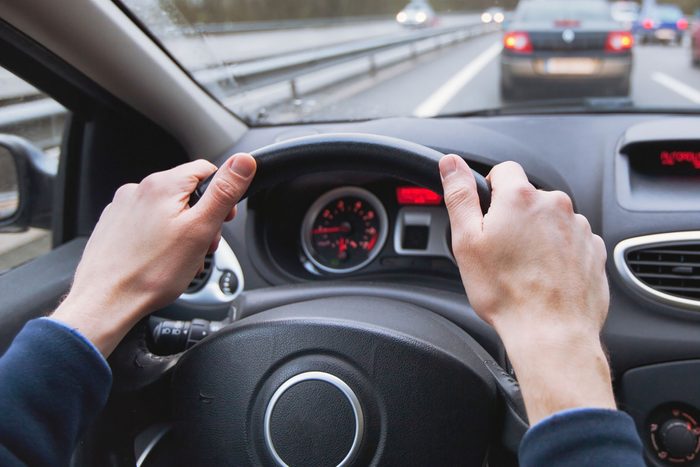
While driving
According to the United States Department of Transportation, distracted driving claimed 3,522 lives in 2021. And as the DOT’s site notes, “You cannot drive safely unless the task of driving has your full attention. Any non-driving activity you engage in is a potential distraction and increases your risk of crashing.” If you do talk on the phone while driving, you need to go hands-free in most states—it’s the law and also common sense. You should have two hands on the wheel and be ready to respond to emergency situations.
What to do instead: If you choose to talk on the phone while driving, use your car’s Bluetooth speaker and not earbuds or headphones (which make you less alert to your surroundings). In 15 states—including California, Colorado, Florida, Massachusetts, Minnesota and New York—it’s against the law to wear headphones while driving.
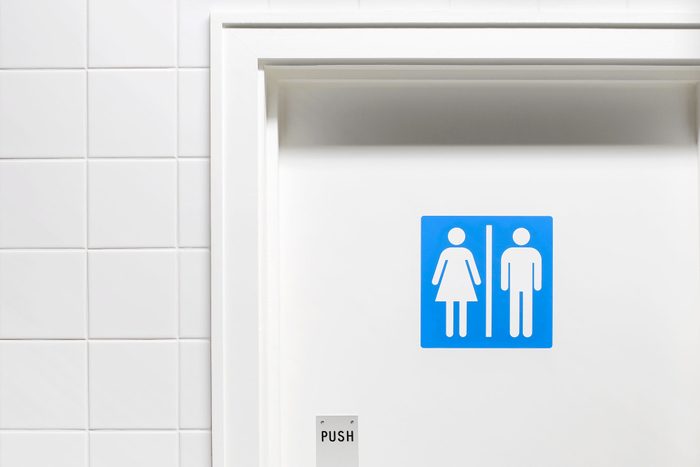
In a public restroom
“When talking on the phone, the one thing someone doesn’t want to hear in your call’s background is flushing sounds … or worse,” Leighton says. Plus, just think about the germs. Studies have shown that flushing toilets release germs into the air, and if you have your phone out, you may be subjecting your device (and therefore yourself!) to germs such as norovirus, salmonella, E. coli, MRSA and hepatitis A. When you’re done in the restroom, washing your hands before touching your phone is a wise choice.
What to do instead: “If you simply cannot wait to communicate until you’re done using the facilities, then text-based communication is your only option,” Leighton says (though, of course, this doesn’t solve the germ problem). “Just be sure not to needlessly tie up a stall, urinal or sink as you do it.”
About the experts
- Bob Otter is a retired Fire Department Captain with 26 years of experience in fire and EMS. He is also the founder of CitizenAID, an organization dedicated to empowering the public with the skills and equipment needed to save the lives of seriously injured people before professional medical care arrives at a scene.
- Chris Hauk is a consumer-privacy expert with Pixel Privacy.
- Laura Windsor, founder of the Laura Windsor Etiquette & Protocol Academy in London, went to school with the Princess of Wales (Kate Middleton) and was trained by one of the members of the royal household who worked for Queen Elizabeth II.
- Nick Leighton is an etiquette expert and the host of the weekly comedy podcast Were You Raised by Wolves?
- Jules Martinez Hirst is an etiquette expert and the co-author of The Power of Civility.
- Mariah Grumet is the founder of Old Soul Etiquette.
Sources:
- FDA: “Potential Cell Phone Interference with Pacemakers and Other Medical Devices”
- United States Department of Transportation: “Distracted Driving”
- New York Times: “How Bad Are the Germs in Public Restrooms, Really?”
